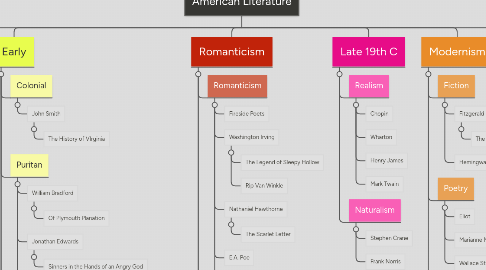
1. Ongoing
1.1. Reading
1.1.1. Annotations
1.1.2. Conclusions and Inferences
1.2. Writing
1.2.1. Blogging
1.2.2. Reflections
1.2.3. Claim
1.2.4. Support and Development
1.3. Thinking
1.3.1. Original
1.3.2. Think for yourself
1.3.3. Think about thinking
1.4. Speaking
2. Early
2.1. Colonial
2.1.1. John Smith
2.1.1.1. The History of VIrginia
2.2. Puritan
2.2.1. William Bradford
2.2.1.1. Of Plymouth Planation
2.2.2. Jonathan Edwards
2.2.2.1. Sinners in the Hands of an Angry God
2.2.3. Mary Rowlandson
2.2.3.1. Captivity and Restoration
2.2.4. Edward Taylor
2.2.4.1. Huswifery
2.2.4.2. Upon a Spider Catching a Fly
2.2.5. Anne Bradstreet
2.2.5.1. Upon the Burning of Our House
2.2.5.2. To My Dear and Loving Husband
2.2.5.3. Upon the Birth of One of Her Children
2.3. Revolutionary
2.3.1. Benjamin Franklin
2.3.1.1. Autobiography
2.3.1.2. Poor Richard's Almanac
2.3.1.3. Remarks Concerning the Savages of North America
2.3.2. Thomas Paine
2.3.3. Thomas Jefferson
2.3.4. Phillis Wheatley
2.4. Native American
2.4.1. How the World Was Created
2.4.2. The Gift of the Sacred Calf
2.4.3. Logan's Lament
3. Romanticism
3.1. Romanticism
3.1.1. Fireside Poets
3.1.2. Washington Irving
3.1.2.1. The Legend of Sleepy Hollow
3.1.2.2. Rip Van Winkle
3.1.3. Nathaniel Hawthorne
3.1.3.1. The Scarlet Letter
3.1.4. E.A. Poe
3.1.5. Herman Melville
3.2. Transcendentalism
3.2.1. Thoreau
3.2.2. Emerson
3.2.3. Harriet Jacobs
3.3. Transitional
3.3.1. Emily Dickenson
3.3.2. Walt Whitman
4. Late 19th C
4.1. Realism
4.1.1. Chopin
4.1.2. Wharton
4.1.3. Henry James
4.1.4. Mark Twain
4.2. Naturalism
4.2.1. Stephen Crane
4.2.2. Frank Norris
5. Modernism
5.1. Fiction
5.1.1. Fitzgerald
5.1.1.1. The Great Gatsby
5.1.2. Hemingway
5.2. Poetry
5.2.1. Eliot
5.2.2. Marianne Moore
5.2.3. Wallace Stevens
5.3. Imagism
5.3.1. Pound
5.3.2. William Carlos Williams
6. Postmodern
6.1. Drama
6.1.1. The Crucible
6.1.2. Raisin in the Sun
6.2. Fiction
6.2.1. Vonnegut
6.2.2. Tim O'Brien
6.3. Poetry
6.3.1. Mark Doty
6.4. Graphic Novels
6.4.1. Alison Bechdel
6.4.2. Art Spiegelman

